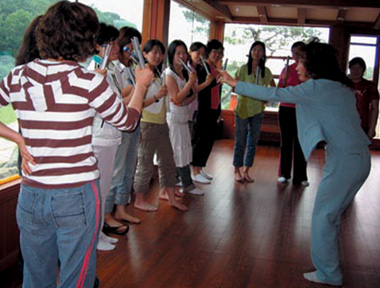Vocal Improvisation and Resonator Bell Play

Music was used therapeutically from the pre-historic age. Witch doctors used sound, rhythm, and magic to cure patients. Now, music therapy is not only limited to therapeutic use, but its use has broadened as people continue to pursue a well-being life. Coping with stress, a common source of troubles for modern people, may be helped by music therapy.
The Music Therapy Professional Education Course at Ewha's School of Continuing Education is a certification program for those who desire to be music therapists. But music therapy is not only for the disabled, but also for those who live an "ordinary" life. In the process of learning, the future therapists experience the benefits of music before they become therapists and treat their clients.
Professor Kim Kun-ja, the president of the Korean Association for Music Therapy, teaches the music therapy course at Ewha and tells how it is related to self-realization in three ways: musical communication, self expression, and emotional identification. First, Kim says music is a way to communicate outside of language. "The form of music is a repetition of questioning and answering." Second, says Kim, music helps relieving emotional problems as feeling becomes diluted when expressed. Lastly, a client can identify herself in the musical work, and feel affinity with it. Kim says the World Cup song of 2002 had an emotional identification effect to Koreans. When Koreans sang the World Cup song, they felt as if they were also soccer players playing in the field. Consequently, practicing music therapy regularly, a person's ego is strengthened and one can gain a sense of achievement.
There are two activities in Ewha's music therapy class where students can directly experience these aspects of music therapy: "Vocal Improvisation and Discussion," and "Resonator Bell Play." In Vocal Improvisation and Discussion, all students lay down in a row. A sound is given to the first person and each person delivers the sound to the person at the end. One can amplify the sound, or, one can create a new sound. Through this process one finds her own "essential sound." In Resonator Bell Play, each student is given a hand bell and one student comes out to the front to conduct the other students. This process requires direct communication, so students interact with each other. And, says Kim, this naturally links to a positive feeling about oneself. Student Lee Min-hee ('04, Composition), says, "Then doing the hand bell play, students at first were too shy to conduct in front of the group. But, as time passed, we all became eager for a turn as conductor." For most students, the music therapy class changes their lives in a small way. But, for Park Seon-yang ('05, Chungang Univ.) the change was dramatic. Park says, "This music therapy class made my personality to be smoother and brighter, which was dark and negative before." She says that through Professor Kim's personal therapy with her, she opened her mind to reach this turning point of her life. Park says, "I had a sense of inferiority, of not being able to meet my parents' needs. But, as I played the drums, I let my hidden self come to the surface and this incident made me burst into tears."
Professor Kim says there are not more ways for university students to access music therapy easily. So, for students who are interested in music therapy, she recommends the Korean Association for Music Therapy's Saturday class, which is open to people of any age, academic level, or career status.
Ewha Voice
evoice@ewha.ac.kr

